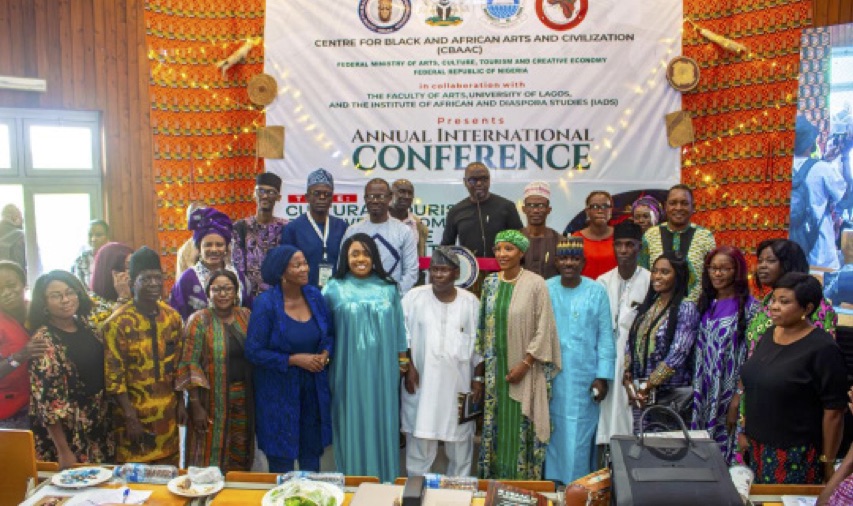By Zika Bobby
The Centre for Black and African Arts and Civilization (CBAAC) recently concluded a two-day international conference in collaboration with the University of Lagos. The event, themed “Cultural Tourism, Creative Economy and Sustainable Development in Africa,” brought together experts and stakeholders to discuss the role of culture in driving growth and development.

In her welcome address, Aisha Adamu-Augie, Director-General of CBAAC, expressed her delight in hosting the conference. She emphasized the significance of the gathering, stating that it would chart a course for a thriving and resilient cultural sector in Africa.
“We meet not only to exchange ideas but to chart a course for a thriving and resilient African future, one that fully harnesses the power of cultural tourism, the dynamism of the creative economy, and the principles of sustainable development.
“The story of Africa is rapidly evolving, and tourism is central to that transformation. According to the World Travel and Tourism Council, tourism contributed $168 billion to Africa’s GDP in 2024 and is poised to create over 18 million new jobs in the coming decade. “These figures affirm cultural tourism is not merely a leisure sector, but a foundational pillar of Africa’s economic revival. They are not just statistics; they represent livelihoods, opportunities, and hope for millions of Africans,” she said.
Adamu-Augie said tourism is more than a journey but an experience of culture. And culture, in Africa, she said, is a living, breathing force. “Cultural tourism such as our festivals (Durbar, Ojude-Oba, Osun-Oshogbo, New Yam Festivals etc), heritage tours, indigenous arts are not just products, they’re growth ecosystem. Every tourist becomes not only a visitor but also a participant, consumer, and investor. Every visitor who attends a local festival, buys a handcrafted item, or watches a traditional performance is directly investing in Africa’s creative economy. This connection between tourism and creativity forms a system that empowers communities, supports artisans, and tells our stories on a global stage.
Across the continent, our creative industries: film, music, fashion, visual arts, storytelling are thriving and currently generate over $4.2 billion annually and have the potential to create up to 20 million jobs and generate $20 billion per year. As projections show tourism revenue reaching $25.16 billion in 2025, it is clear that our creative sectors must be positioned to benefit equitably from this growth,” she said
She added: “While we celebrate these gains, we must confront the sober truth: that growth without sustainability is not progress, it is a short-lived promise. This critical insight drives the focus of our conference today and I am optimistic that our speakers of will proffer workable solutions to all the points raised from today’s programme.
This conference is not just an intellectual exercise; it is a moment of reckoning and responsibility. At this stage, we cannot afford to let the momentum of African tourism and creativity become unsustainable or inequitable. Let us use this moment not just for statistics and speeches, but for action that uplifts our traditions, honours our heritage, empowers our youths, and protects our planet.”
The conference issued a communique outlining key recommendations and resolutions.
it was agreed that cultural tourism can promote eco-system and responsible travel, fostering appreciation for biodiversity and traditional knowledge system that supports environmental conservation, creative economy as one of the most vibrant and rapidly growing sectors in the global business chain, offering new vistas and high-growth opportunities especially for developing and emerging economies of the world, Arts and culture in Nigeria stand among the most dynamic creative industries in the world, cultural tourism and the creative economic sector is experiencing rapid growth and has the potential to become a major driver of economic growth and job creation.
Despite its immense cultural capital, Africa’s share of global creative goods exports is less than 1 percent, and that indigenous language is vital for preserving cultural identity and fostering inclusive development.
Africa’s population is projected to reach 2.5 billion by 2050 (UN DESA, 2019), and the tourism and creative economy sector can absorb surplus labour and reduce poverty.
On recommendations, they agreed that msic, film, literature and digital arts should be integrated into national development plans to foster job creation and global competitiveness, government should create comprehensive national policies for the creative and cultural sector, African indigenous knowledge system should inform tourism policies to ensure authentic, sustainable and decolonise narratives about Africa, and the need for Public – Private Partnerships (PPP) that will facilitate investment in cultural centres, museums, digital art studios, theatres, and festivals to boost the sector.
“Government should enforce copyright, trademark, and indigenous rights laws to protect creators and traditional knowledge.
The African Continental Free Trade Area (AFCFTA) framework should be utilised to ease the cross-border movement of creative goods and services. CBAAC should work closely with the African Union (AU) and other similar institutions in the continent to create modalities and fine-tune strategies for engaging the Diaspora. CBAAC and academic institutions should partner to strengthen research and publish outcomes of studies to advance pan African cultural agenda, ” the communique reads.
Communique drafting committee included, Dr Abisoye Eleshin, lecturer, Institute of African and Diaspora Studies, of Lagos, Dr. Adetayo Ogunlewe, lecturer at the Lagos State University, (LASU), Ojo, Adesegun Dosumu, DD Research and Publications (CBAAC), Jumoke Dare-Lawrence, Chief Research and Publications officer, CBAAC, Obinali Henry P. A (Chief Research Officer, CBAAC) and Hulda Uju Nwoye (Procurement, CBAAC).

